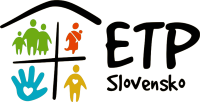Children Transferred Happenings from Daily Life in the Settlement onto the Stage
Talented children and youth from the marginalized Roma settlement Budulovská in Moldava nad Bodvou, who regularly attend the community center, once again showed that trough the art they can express what can only hardly be described by words – that their everyday reality is full of joy and sadness, that they often have to face discrimination in various forms but also that the stage is for them a space where they can freely express their personality.
On Friday, July 18th, in the Centre for Leisure Time Activities CVrČek in Moldava nad Bodvou the final theatrical performance of children and youth from the settlement Budulovská was held. For the past two weeks they had been rehearsing the performance under the guidance of artists from the Dramatic Adventure Theatre (DAT) in New York who in cooperation with ETP Slovakia organized an interactive art workshop for children from marginalized Roma settlements for the third consecutive year. During the two-week workshop children and youth were involved in various activities and games. Interactive workshop helped children to reflect on the events in their life that affected them and it learned them to transfer their joyful and also sad experiences onto the stage.
Final theatrical performance consisted of series of a few short theatre pieces that children and youth had prepared by themselves and it was their emotional testimony about every day’s life situations in the settlement.
On this occasion, the Slumdog Theatre prepared a new performance in which the real life experiences of discrimination experienced by the participants were acted out – discrimination in school, in job interview and in a hostel.
Performance prepared by the children and youth was definitely a powerful experience for an audience, not only for the acting prowess but mainly because of the courage that all amateur actors gathered to pass their own life that is often full of painful moments onto the stage.
The ART4Rom project has been funded with the support from the European Commission.
[nggallery id=156]

